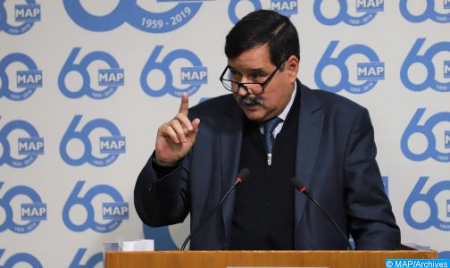The Algerian Regime has Become Geostrategic Obstacle in North Africa – Journalist –
The current Algerian regime, due to the calcification of its political components and its inability to change, has become a geostrategic obstacle in North Africa, a region that struggles to fight against terrorism and to dry up its resources, writes the writer and journalist Talaa Saoud Al Atlassi. In an article under the title “Tebbouniates: the bubbles of the Algerian regime”, published Wednesday by the information website “Machahid 24”, Al Atlassi underlined that the Algerian regime constitutes an obstacle to Euro-African interaction, in particular in the economic domains, which harms both parties and accentuates the marginalization of Algiers. The journalist felt that faced with the challenges of the country’s leadership, this regime cannot do better than these “tebbouniates” which are nothing but bubbles and illusions, deploring the fact that everything that this regime releases and everything it expresses or has expressed leaves no ounce of optimism as to its ability to lead Algeria towards what it deserves, towards what its people aspire to and towards what Moroccans want for this neighboring country in terms of progress, stability and prosperity. Observing that this “clan” of generals subjugates the country, under a civilian cover which keeps this “gang” in a comfortable position in the shadows, Al Atlassi notes that this junta, faced with the drying up of its civilian cover and its social isolation, was content with low-level civilian collaborators, like the man chosen for “the presidency of Algeria”. This president, who belittles Algeria, is a prolific producer of amusing rantings (tebbouniates) on Saturday evening before his press, to which he has become addicted. He tackles burning issues by fanning the fire instead of extinguishing it, the author of the article adds. The president, in the exercise of his attributions during his official meetings, “tries to prove that he does not only know the grammar, but that he can add to it (…), thus deepening the aversion of the society towards the State and destroying the bridges that connect them”, says Al Atlassi. The one-upmanship he engages in amuses the country’s foreign partners as much as it intrigues and drives them to despair, the journalist points out. Al Atlassi recalls one of these rantings, which led the Spanish Minister of Foreign Affairs to respond to criticism against the position of the Spanish government favorable to the Moroccanness of the Sahara. The Spanish top diplomat described the words of the Algerian president as a “sterile debate”, recalls the journalist, who notes that “this delicate diplomatic bombardment in just two words, provoked a long and useless reaction on the part of an agent who serves the Algerian presidency”. The author of the article considers that it is this same “sterile debate” which marked the approach of the “president” with regard to the situation in Libya, by supporting one part against another…It is this same president who boasts of his sponsorship of the settlement of the Libyan crisis and of reconciliation between all its parties, in a country with which Algeria shares a long and rather sensitive border”, writes Al-Atlassi. The author of the article wonders whether the president mentioned Libya to ask for “reconciliation” or to fan the flames of the crisis?. The truth, says Al Atlassi, is that the Algerian regime is sickly and sterile, and that the “president” is only the “voice of his master”, a less inspired voice and of poor eloquence. However, the situation in Algeria and its environment and the international situation require a political leadership of Algeria that is sensitive to the interests of its people and aware of the requirements for overcoming the shortcomings of history and adhering to a realistic and dynamic path, armed with audacity and courage, the writer underlines. The author of the article emphasizes, in this regard, that the Algerian regime has no choice but to initiate the renewal of its structures. It not, it will continue to be a burden on his people and accentuate its isolation internally in the face of the rise of angry sectors within society, within the business oligarchy and among its military arm.

